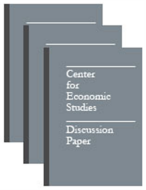Analytic Use Of Economic Microdata; A Model For Researcher Access With Confidentiality Protection
Analytic Use Of Economic Microdata; A Model For Researcher Access With Confidentiality Protection
Abstract
A primary responsibility of the Center for Economic Studies (CES) of the U.S. Bureau of the Census is to facilitate researcher access to confidential economic microdata files. Benefits from this program accrue not only to policy makers--there is a growing awareness of the importance of microdata for analyzing both the descriptive and welfare implications of regulatory and environmental changes--but also and importantly to the statistical agencies themselves. In fact, there is substantial recent literature arguing for the proposition that the largest single improvement that the U.S. statistical system could make is to improve its analytic capabilities. In this paper I briefly discuss these benefits to greater access for analytical work and ways to achieve them. Due to the nature of business data, public use databases and masking technologies are not available as vehicles for releasing useful microdata files. I conclude that a combination of outside and inside research programs, carefully coordinated and integrated is the best model for ensuring that statistical agencies reap the gains from analytic data users. For the United States, at least, this is fortuitous with respect to justifying access since any direct research with confidential data by outsiders must have a "statistical purpose". Until the advent of CES, it was virtually impossible for researchers to work with the economic microdata collected by the various economic censuses. While the CES program is quite large, as it now stands, researchers, or their representatives, must come to the Census Bureau in Washington, D.C. to access the data. The success of the program has led to increasing demands for data access in facilities outside of the Washington, D.C. area. Two options are considered: 1) Establish Census Bureau facilities in various universities or similar nonprofit research facilities and 2) Develop CES regional operations in existing Census Bureau regional offices.




